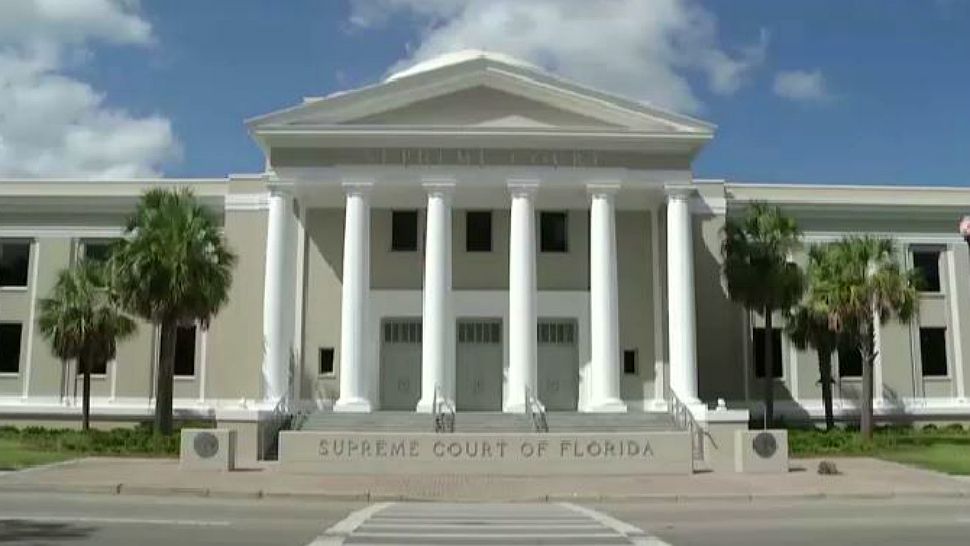ORLANDO, Florida — Whether it be Republican Ron DeSantis or Democrat Andrew Gillum, Florida’s next governor will achieve one major accomplishment when taking office that was not seen by Gov. Rick Scott — packing the state supreme court.
- Next Florida governor will reshape the state's supreme court
- Three justices leaving the court in January 2019
- Court ruled Gov. Scott does not have authority to fill vacancies
In his eight years as governor, Rick Scott appointed just one justice to the Florida Supreme Court.
Scott’s first opportunity came late, in 2016, when he appointed Justice Alan Lawson.
Monday, the court shot down any remaining hope Scott had left to fill three upcoming vacancies on the bench.
Justices Barbara Pariente, Peggy Quince, and R. Fred Lewis will leave the court in January 2019 because each will have reached the state’s mandatory retirement age for judges.
Scott previously pushed to name their replacements before leaving office but was challenged in court by the League of Women Voters.
The court sided with LWV Monday in saying that Scott overstepped the bounds of his authority and ruled that the next governor elected in November “… has the sole authority” to fill the vacancies.
The justices’ terms will end January 8, 2019, the day the governor-elect will be sworn in.
Pariente, Quince, and Lewis represent part of the narrow 4-3 liberal majority on the court, which has often acted as a balance to the Republican controlled executive and legislative branches.
The potential to swing the court one way or another has become a focal point on the campaign trail.
“I will be somebody who will appoint justices to the state supreme court who understand the proper role of the court — to apply the law and constitution as it’s actually written, not to legislate from the bench, not to rewrite the law, not to rewrite the Constitution, not to impose their philosophies on the rest of the state,” DeSantis said.
State Republicans have taken their reaction one step further in telling voters the potential consequences of the three vacancies.
“The choice for this election is clearer than ever,” said the Republican Party of Florida Chairman Blaise Ingoglia said in a statement. “Andrew Gillum would appoint radical, activist justices who would legislate from the bench and work to eliminate school choice, erode pro-life principles, and impose big-government ideology on our state.”
Democrats have denounced the Republicans’ take.
“I am pleased the Florida Supreme Court has brought closure to this important issue finding, as we have consistently stated, that the next governor of Florida will appoint the next three Supreme Court justice,” Gillum said. “It is a duty I take extremely seriously and, as governor, one of my top priorities will be to restore integrity to the judicial nominating process.”
Judicial Nominating Commission
The governor-elect will have only so much say in who to name to the state supreme court.
The state’s next governor will have to choose replacements only from a list developed by the Judicial Nominating Commission, a panel of nine individuals handpicked by Gov. Scott.
The JNC’s role is to interview potential justice candidates and then provide formal recommendations for the next governor to consider.
The governor cannot reject the JNC list, as long as a minimum number of candidates are provided.
Jason Unger, Chairman of the JNC, says there are 59 applicants, which the board will interview during meetings in early November.
Unger says the commission remains focused on having a list of final recommendations by approximately November 10, several days after the election.
The Supreme Court scheduled oral arguments for November 8, where it will take up the issue of when the JNC can certify its list of nominee.
Governors are often given 60 days to make a decision once presented with a final list of candidates. The Supreme Court’s order released on Monday extends that deadline window, saying that it “… begins to run only when the governor with the authority to appoint has taken office,” which is January 8, 2019.
Attorneys for the League of Women Voters expressed concern that the JNC’s timetable.
“While the issue of when the JNC may make its nominations is yet to be resolved, one thing is clear now – there is no reason for the JNC to rush through the nominating process as it has been doing,” John Mills, attorney for League of Women Voters and Common Cause Florida, said. “It is now clear that the artificial deadline of the applications a month before the election created an unfair chilling effect on many potential applicants, especially those in private practice.”
Mills said that candidates would apply based on whether they felt they had any chance at making the final list, an assessment made based on who was appointing the positions.
“Those chances change according to who will be making the appointments,” Mills said. “It is likely that most people considering whether to apply believed Gov. Scott when he repeatedly claimed he would be making the appointments. This created a tremendous disincentive for applicants who knew there was little chance they would be appointed by Gov. Scott.”
The Supreme Court is expected to release a final order after oral arguments on November 8.
Unger told Spectrum News they are focused on the current timeline to ensure there is as little of a vacancy on the court as possible.




